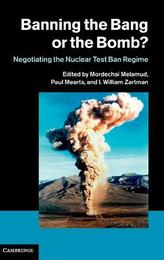
|
Banning the Bang or the Bomb?: Negotiating the Nuclear Test Ban Regime
Hardback
Main Details
| Title |
Banning the Bang or the Bomb?: Negotiating the Nuclear Test Ban Regime
|
| Authors and Contributors |
Edited by Mordechai Melamud
|
|
Edited by Paul Meerts
|
|
Edited by I. William Zartman
|
| Physical Properties |
| Format:Hardback | | Pages:410 | | Dimensions(mm): Height 235,Width 155 |
|
| ISBN/Barcode |
9781107044005
|
| Classifications | Dewey:327.1747 |
|---|
| Audience | | Professional & Vocational | |
|---|
| Illustrations |
3 Tables, black and white; 5 Maps; 3 Halftones, unspecified; 12 Line drawings, unspecified; 3 Tables, black and white; 5 Maps; 3 Halftones, unspecified; 12 Line drawings, unspecified
|
|
Publishing Details |
| Publisher |
Cambridge University Press
|
| Imprint |
Cambridge University Press
|
| Publication Date |
17 April 2014 |
| Publication Country |
United Kingdom
|
Description
The Comprehensive Test Ban Treaty (CTBT), negotiated between 1994 and 1996, is the latest development in the nuclear arms control regime. It continues to serve a vital role in preserving the privileged status of the nuclear weapons states and barring the way to proliferation. Banning the Bang or the Bomb? brings together a team of leading international experts who together analyse its negotiation as a model of regime creation, examining collective dynamics, the behaviour of individual countries, and the nature of specific issues. The book offers practical guidance and training for members of the Comprehensive Nuclear Test Ban Treaty Organization future inspectorate to help negotiate their way during an on-site inspection (OSI) in an inspected state. This is a valuable resource for researchers and professionals alike that turns an analysis of what has happened into a manual for what is about to happen.
Author Biography
I. William Zartman is an internationally known analyst and theoretician of the negotiation process. He is Professor Emeritus of Conflict Resolution at the School of Advanced International Studies (SAIS), The Johns Hopkins University, member of the steering committee of the Processes of International Negotiation (PIN) Program at Clingendael (The Netherlands), member of the UN Academic Advisory Council on the Mediation Initiative, and advisor to the Secretary-General, and holds an honorary doctorate from Louvain University (Belgium) and a doctorate from Yale University. He is author and/or editor of two dozen books. Dr Zartman is associated with a number of key concepts in negotiation analysis, such as formula, ripeness and diagnosis. He has offered a new analytical framework for evaluating international regimes as recursive negotiations rather than as compliance. Mordechai Melamud is a former research physicist with a PhD in experimental physics from the Weizmann Institute of Science (Rehovot, Israel), received in 1976. From 1967 Dr Melamud was employed by the Israel Atomic Energy Commission (IAEC) as a senior scientist and a Group Leader in experimental physics. He lectured at the Ben-Gurion University (Beer Sheba, Israel) and is co-author of more than a hundred publications in scientific journals. After 1997 his interest turned to the verification regimes of international treaties concerning nuclear disarmament. From 1998 he was employed at the IAEC headquarters as deputy director for international relations and as special assistant to the DG for the implementation of the Comprehensive Nuclear Test-Ban Treaty (CTBT) in Israel. From 1998 to 2002 he served as a member, and later the head, of the delegation of Israel to the CTBTO policy making organs. From 2002 until 2012 he was Chief of Training in the On-Site Inspections (OSI) Division of the CTBT Organization in Vienna, Austria, in charge of development of the training program for future inspectors under the OSI regime of the CTBT, with particular focus on the negotiations process inherent to the special modalities of the CTBT inspections regime. Dr Melamud is now a retiree of the CTBTO and the IAEC and is an associate member of the PIN group. Paul Meerts is an international negotiation analyst. Since 1989 he has trained thousands of diplomats, military officers and university students in more than ninety countries. In that year he became connected to the Processes of International Negotiation (PIN) Program, and became a member of its Steering Committee in 1999. Meerts has published on subjects including effective training of interstate negotiators, entrapment in negotiation, the evolution of diplomatic negotiation, order and boundaries in bargaining, and 'egotiation' - the impact of the egotist negotiator on the negotiation process and its outcomes. He co-edited several PIN books and contributed to its network newsletter PINpoints for fourteen years. Having been the Director of Training and Deputy General-Director of the Netherlands Institute of International Relations 'Clingendael' from 1983 till 2006, he brought PIN under its roof in January 2011. Meerts has been training civil servants of the European Commission, the Council Secretariat and the Member States inside and outside the European Diplomatic Program since it came into existence in 2001. He has been a professor at the College of Europe in Bruges since 2006. On security issues he has taught at NATO Defence College in Rome since 1989. His interest in the Comprehensive Nuclear Test-Ban Treaty stems from his training activities for the CTBTO, both at headquarters in Vienna and in the Urals.
Reviews'Providing useful generic lessons concerning verification, the role of non-state actors and the training of negotiators, the book is a must-read for anyone interested in arms control and multilateral negotiations.' Christer Joensson, Lund University, Sweden 'This volume will stand as a detailed guide to nuclear testing's past and present and a rare schematic of how international regimes can be built in practice.' Jonathan Hunt, H-Net
|